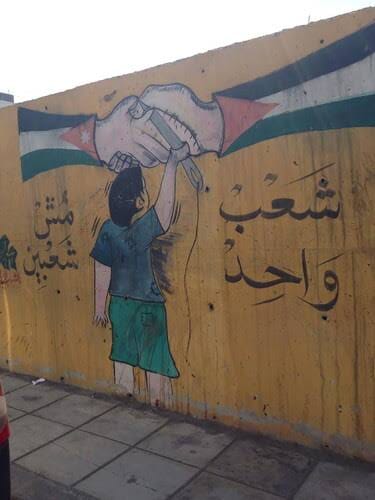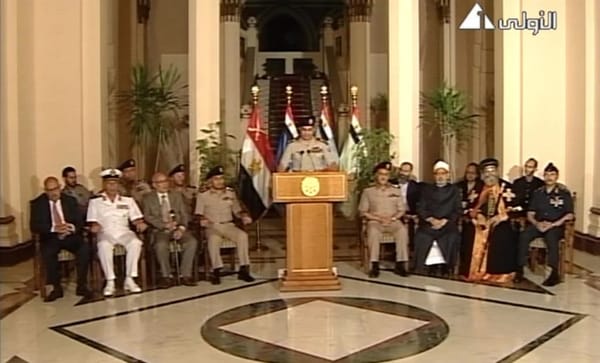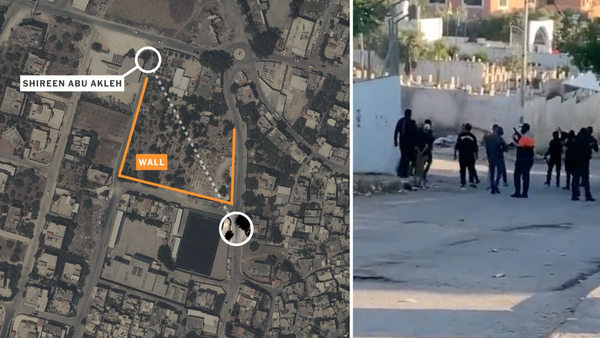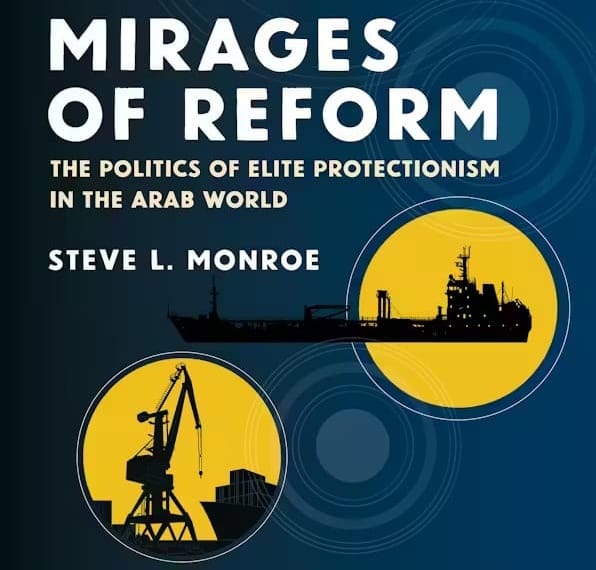Making sense of Syrian sectarianism
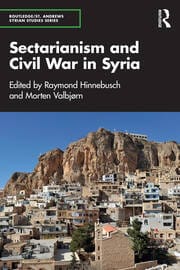
Plus a full new roundup from the MENA academy!
Syria's new government has made significant progress in recent weeks, but still has a tough road ahead of it. On the positive side, the Trump administration appears to be following through on its commitment during the Saudi Gulf summit to lift sanctions on Syria and support its transition. Most of the world's governments – including some hardcore anti-Islamist ones like the UAE and Egypt, and even Iraq's which has extremely nasty memories of the new president – seem willing to look past Ahmed Sharaa's recent past as a jihadist insurgency leader. It's genuinely hard to think of a reversal of fortunes as complete as the former head of an al-Qaeda franchise being invited to address the UN General Assembly and visit Washington. With any luck, this diplomatic recognition and lifting of sanctions will open the gates for desperately needed reconstruction assistance, humanitarian aid, and the safe repatriation of refugees.
On the other side, Syria continues to struggle with sectarian violence. While Sharaa and the regime have promised tolerance and pluralism, the path towards stability is pockmarked with deep legacies of violence and repression, unaddressed memories and resentments of past atrocities, the simmering potential of an emergent Asadist insurgency, and cynical external actors willing to take advantage. The worst of those thus far continues to be Israel, which has brazenly seized indefinitely a wide swathe of territory as its new "buffer zone", bombs at will across the country, and warned the Syrian government against deploying troops in the south (while still holding it responsible for missile launches from the territory from which it is unable to control). One of the reasons Israel has given for its aggressive moves in Syria has been the protection of the Druze, whether or not they asked for such help.
Anyone who wants to understand the deeper context of these sectarian tensions, how they emerged, and what they might mean for the future of a unified Syria should read Sectarianism and Civil War in Syria, the excellent new volume edited by Raymond Hinnebusch and Morten Valbjørn. Sectarianism and Civil War in Syria brings together more than a dozen scholars, many of them younger Syrian academics based in Europe and the UK. This impressive collection of scholars examines the question of sectarianism from a wide range of empirical and theoretical perspectives which offers essential background and novel insights.
Sectarianism and Civil War in Syria is really two books in one, framed by a theoretical tour de force introduction and an incisive conclusion both co-authored by Hinnebusch and Valbjørn. The introduction walks readers through the vast literatures on sectarianism, laying out sharply competing perspectives – from those rooted in ancient hatreds and deep cultural essence to those focused on the machinations and manipulations of what I once called the "entrepreneurs of cynical sectarianism". They then advance a multi-level theoretical synthesis rooted in sectarianization and securitization within a context of variable stateness shaped by a distinctive historical sociology and international context. Their theoretical overview and shrewd judgements will help anyone organize their thinking about the chaotic and complex Syrian environment (and also help graduate students prepare for their comprehensive exams).
Part two of the book is all Hinnebusch: five single-authored chapters presenting the full analytical and historical analysis of one of the world's top experts on Syria and the broader historical sociology of the Middle East. Hinnebusch, as in his earlier work, approaches sectarianism through an historical and an international lens, showing how Syria's unique sectarian map emerged as the product of state building and international competition. He then traces the changes in sectarian identity and mobilization during the civil war, highlighting the interaction between regime strategies, external interference, and endogenous changes within the opposition and the shattered Syrian public.
Hinnebusch's chapters alone would have been a significant contribution to the literature. Instead, his analysis is profoundly enriched by the contributions of the mostly younger and mostly Syrian scholars (most of them linked in some way to his Syria Studies program at St Andrews). Some of the chapters dig deep into highly local contexts such as Homs and Damascus (Ola Rifai), Aleppo (Maria Chalhoub), Hama (Samer Bakkour), Idlib (Bakkour and Gareth Stansfield), and Deir ez-Zour (Haian Dukhan, Sinan Hawat and Mohammed Hassan). Particularly relevant to the current sectarian crisis are chapters on the Druze (Maria Kastrinou, Salam Said, Rawad Jarbouh, and Steven Emery), the Syrian coast (Talip al-Khayer), and Christians (Rana Khalaf). It's capped off by a reflection on urbicide and space in Damascus and Aleppo by Gabriel Pla, and a full conclusion by the editors.
Elsewhere in the MENA Academy, excellent research continues to appear annoyingly quickly. Because I've been remiss in my duties, some of these articles and special issues are weeks old! I'll try to keep up.
We begin with a special issue curated by Marie Vannetzel and Marine Poirier and a related article by Sarah Almasry on the politics and psychology of the failed Eygptian revolution and the brutal state violence which followed. That's followed by an impressive new APSR article by Salam Alsaadi (an earlier version of which I fondly recall from a POMEPS workshop) on the stability of minority regimes. We then turn to Ewan Stein's fascinating analysis of Egyptian-Turkish relations, drawing on his provocative recent book on the region's international relations. Kristian Coates Ulrichsen then gives an incisive and highly relevant analysis of the new dynamics of US-Gulf relations in a transactional age. Turning from IR to political theory, Navid Hassanzadeh examines recent trends in Moroccan political thought towards democracy and the state. Finally, Alex Waterman and James Worrall look into the messy and deeply flawed process by which the architects of American counterinsurgency strategy tried to "know the enemy" – a question close to my academic heart and about which I have some thoughts I might add in due course. We conclude the roundup with a special issue featuring Rafeef Ziadah, Christian Henderson, Omar Jabary Salamanaca, Sharri Plonski, Charmaine Chua, Riya Al Sanah, and Elia El Khazen which approaches Gaza through a lens of infrastructure, political geography, and space.
Marie Vannetzel and Marine Poirier, "Introduction: Surviving Egypt’s Foreclosed Revolution," Middle East Critique (May 2025). ABSTRACT: This special issue examines the paradoxical aftermath of Egypt’s 2011 revolution through the lens of foreclosure – a process that simultaneously shuts down revolutionary possibilities while perpetuating instability. Moving beyond studies of revolutionary failure or repression, the issue analyzes how diverse social actors (activists, martyrs’ families, purged elites, and ordinary citizens) navigate a liminal condition where the revolutionary illusio has faded, yet prerevolutionary ‘normality’ remains unattainable.
Sarah Almasry, "The echoes of defeat: Resentment in post-revolutionary Egypt," Mediterranean Politics (May 2025). ABSTRACT: The brutal Rab‘a massacre in 2013 followed by Al-Sisi’s rise to power cemented the defeat of Egypt’s 2011 revolution. With defeat narratives remaining fragmented and no collective reckoning in place, former participants interpret defeat as betrayal by the revolutionary movement and its constituents. Such a perception conjures a constellation of political emotions such as despair, disappointment, and resentment – this contribution focuses on the latter. As a socio-political emotional reaction to painful relational experiences, resentment responsibilizes individuals and collectives for their political actions and past injustices, but when ‘recoded and conjoined with other collectivizing emotions … it can open new political horizons’. Drawing on life history interviews with former rank and file participants in the Egyptian revolution, this contribution explores post-defeat resentments. In hindsight, former participants are resentful of the classism, reproduction of generational and spatial hierarchies, and complicity in sexism and sexual violence they witnessed occurring within the ranks of the revolution. Resentment, however, is not the end of politics. Reflecting on revolutionary defeat and its ‘negative’ emotions is not defeatist but rather a constructive, healing practice to reckon with setbacks and understand the lasting social, emotional, and political legacies of revolutionary action in the afterlives of former participants.
Salam Alsaadi, "Unconditional Loyalty: The Survival of Minority Autocracies," American Political Science Review (June 2025). ABSTRACT: Contrary to the conventional view that minority regimes are vulnerable to breakdown, many of these regimes exhibit remarkable durability. From 1900 to 2015, minority autocracies that exclude a single majority ethnic group (e.g., regimes in Bahrain, Syria, and Apartheid South Africa) remained in power twice as long as other autocracies. This article argues that this durability is rooted in their unique ethno-political configuration, which enables them to foster a largely unconditional loyalty due to the ruling minority’s fear of being subjected to majoritarian rule. Such loyalty endows them with an exceptional capacity to withstand major challenges by fostering in-group demobilization and policing, pro-regime countermobilization, and coethnic elite loyalty. This article employs a multi-method approach, using a novel dataset of minority regimes and a case study of Bahrain based on original interviews. The findings highlight the conditions under which ethnic group loyalty can play a central role in autocratic survival.
Ewan Stein, "Egyptian responses to Turkey’s MENA policy from the Arab spring to the Gaza crisis: sub-imperialisms and regional order," International Politics (June 2025). ABSTRACT: This paper unpacks the nature and drivers of Egypt’s relations with Turkey from 2011 until 2024. I conceptualise both states as ‘sub-imperialist’ powers that while remaining dependent upon the West enjoy relative autonomy to influence their regional environment. The paper analyses Egyptian responses to Turkish attempts to shape the Egyptian and other regional political systems, assume a leading role in mediating the conflict in Israel–Palestine, and intervene in Libya through three phases: (1) a brief moment of alignment from 2011 to 2013; (2) a period of discord that spanned the years 2013 to 2022; and (3) a phase of rapprochement from 2022 until the time of writing. The paper’s central argument is that Egypt’s policies were conditioned by its dependency upon the USA and close relationship with Saudi Arabia, as well as its domestic political situation, and that its securitised modality of sub-imperialist expansion has so far prevailed over Ankara’s attempts to export the Turkish model as a political framework supportive of Western imperialism.
Kristian Coates Ulrichsen, "Transactional Politics: Rethinking U.S.-Gulf Security and Defence Relationships amid U.S. Decline," Alternatives (June 2025). ABSTRACT: This article analyses the shifts in security and defence policies across the six states of the Gulf Cooperation Council (GCC) and disentangles political and geopolitical strains in the U.S.-Gulf relationship from practical measures to boost cooperation and deepen interoperability. In examining the trajectory of security and defence relationships, the article assesses the stability and durability of the underlying components of U.S.-Gulf partnerships in a time of rapid change. The article begins a section that details how and why the perception of U.S. disengagement has evolved, despite ongoing reliance on facilities such as Al-Udeid in Qatar for forward basing arrangements, before a second section examines regional responses to the withdrawal from Afghanistan in 2021, the Russia-Ukraine war in 2022, and the Israeli war in Gaza that erupted in 2023. A third section explores the ‘nuts and bolts’ of security and defence relationships and considers issues such as U.S. arms sales and Department of Defense programs, such as Red Sands in Saudi Arabia and the Comprehensive Security Integration and Prosperity Agreement with Bahrain, as ways to boost cooperation in the face of political tension and stiff competition. As U.S. troop levels have ebbed and flowed, a final section considers whether a more flexible approach to security relationships is sustainable in a far more transactional era of international power and politics.
Navid Hassanzadeh, "Democracy and the State in Contemporary Moroccan Political Thought," Middle East Critique (June 2025). ABSTRACT: Given the relapse into authoritarian rule in many countries that were affected by the 2010–2011 Arab uprisings, many commentators have looked outside of formal political spaces to glean progressive changes across the region. Left unclear in such an orientation is how the state should be treated, and whether its institutions can be made to reflect the aspirations for freedom and social justice that drove the popular movements for change. This article turns to contemporary Moroccan political thought, in particular to three Moroccan intellectuals – Abdallah Laroui (1933–), Mohammed Noureddine Affaya (1956–), and Abdelilah Belkeziz (1959–) – for a response. It shows a trend in the direction of theorizing the state in a democratic manner across their works, influenced by the shifts in political and social life inaugurated by the 2010–2011 uprisings. It also argues that their respective contributions can serve as a corrective to efforts to abandon the state when considering the objectives of democratic transformations in Morocco and the broader Arab region in the present and future.
Alex Waterman and James Worrall, "Know Thy Enemy? Generating, negotiating and codifying knowledge of insurgencies into U.S. Counterinsurgency doctrine, 2004–2006," Journal of Strategic Studies (June 2025). ABSTRACT: Building on existing works which conceptualise doctrine writing as a form of social construction, this article theorises the messy, negotiated processes through which specific forms of knowledge – in this case specific knowledge of insurgencies – are generated, negotiated and codified into doctrine. It illustrates these processes using novel interview data and documentary analysis of exclusive access to drafts and feedback rounds throughout the writing of FM 3–24 Counterinsurgency (2006). This careful process tracing approach reveals, in fine detail, just how far from a linear, objective process of gathering and incorporating knowledge of insurgencies, the codification of knowledge is, forming instead a fluid and negotiated, nonlinear process shaped by stakeholder politics and time constraints. The article develops new tools to label and classify these processes so that they can be better framed and examined. It also reassesses the difficulties of knowing the enemy and places this at the core of the doctrinal process.
Rafeef Ziadah, Christian Henderson, Omar Jabary Salamanaca, Sharri Plonski, Charmaine Chua, Riya Al Sanah, and Elia El Khazen, "Disruptive Geographies and the War on Gaza: Infrastructure and Global Solidarity" Geopolitics (June 2025). ABSTRACT: This forum explores the geopolitics of infrastructure in the context of Israel’s war on Gaza, situating the current genocide within longer histories of settler colonialism, spatial control, and transnational complicity. As homes, hospitals, and schools are reduced to rubble, this destruction is not only military, but infrastructural – an assault on the material conditions of Palestinian life. Infrastructure emerges here not as background, but as a primary mechanism of governance, dispossession, and colonial reordering. From roads and borders to electricity grids and telecommunications, the systems that organise everyday life in Gaza and the West Bank are also those that fragment space, enforce dependency, and suppress self-determination. Rather than viewing this destruction in isolation, contributors trace how it is sustained by regional and global circuits of capital, logistics, arms, and energy. Gaza’s collapse is embedded in a broader political economy of militarism, where supply chains, defence industries, and financial infrastructures turn dispossession into profit. Yet, this forum also foregrounds counter-infrastructures and practices of resistance: from survival networks and subterranean spaces of refusal, to workers’ strikes and transport disruptions that challenge the flows sustaining Israeli militarism. Together, these essays ask what it means to ‘follow infrastructures’ in a moment of mass atrocity – what such a method reveals about power, complicity, and potential rupture. The forum moves beyond documenting destruction to consider how infrastructure is both a tool of domination and a terrain of struggle. Across scales and contexts, it highlights how Palestinians resist infrastructural warfare and how international solidarity movements can intervene in the systems that enable it. In doing so, the forum contributes to a growing body of politically accountable scholarship, mapping not only how infrastructures sustain violence, but how they might be reimagined.
